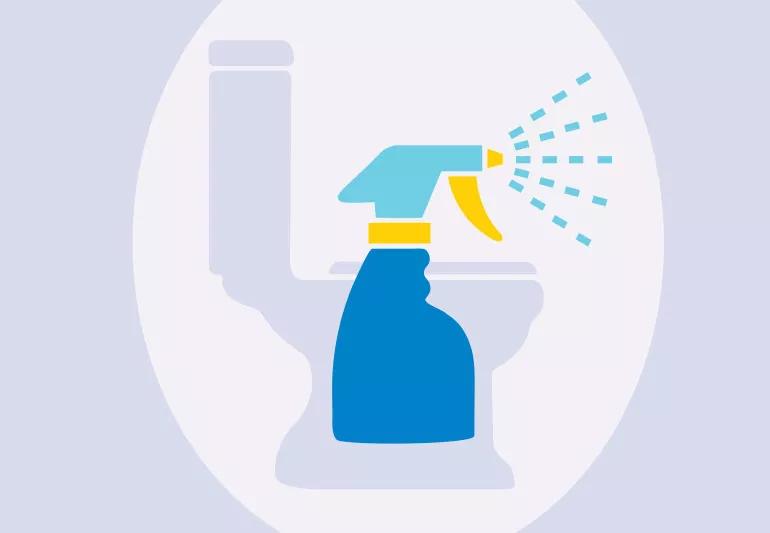You may be causing the problem yourself

Image content: This image is available to view online.
View image online (https://assets.clevelandclinic.org/transform/8cdad855-ea7d-4e69-9d15-a56610b5b60f/itchyBottom-1184854633-770x553-1_jpg)
Spray bottle in bathroom to help with hygiene
Many patients who have anal problems assume they have hemorrhoids and go into the doctor’s office and announce that they have hemorrhoids. What are their symptoms? They say their bottoms itch, or act up, and they feel extra skin down there as they wipe. It must be hemorrhoids, right?
Advertisement
Cleveland Clinic is a non-profit academic medical center. Advertising on our site helps support our mission. We do not endorse non-Cleveland Clinic products or services. Policy
Self-treatment with medicated wipes or cream is their first go-to. After all, the advertisement on the TV said it’s what works. But the “hemorrhoids” don’t go away — they may get worse.
For most, the answer is simple, says colorectal surgeon Massarat Zutshi, MD: You may not have hemorrhoids, and what you’re doing to treat this non-issue is likely making the problem worse.
“People self-diagnosing hemorrhoids is something I see almost daily in my practice,” says Dr. Zutshi. “Hemorrhoids are the favorite diagnosis that is easily misinterpreted for many of my patients.”
Certainly bring up any concerns you have with your doctor, Dr. Zutshi notes. Especially if you notice rectal bleeding along with the other symptoms mentioned above, be sure to talk to your doctor about further treatment.
All humans have hemorrhoids normally. They only become an issue when they become swollen and irritated. Most often, you can’t diagnose that yourself. your doctor needs to examine you.
What patients often suffer from is the result of, ironically, being too clean.
“What happens is a vicious circle. Filled with good intentions, you try to keep your bottom scrupulously clean by vigorous wiping using flushable wipes,” Dr. Zutshi says. “But the unexpected result is that this leads to soreness and itching and the feeling that you have ‘abnormal down there,’ which in your dictionary is hemorrhoids.”
Advertisement
The problem is the chemicals in the wipes dry out your bottom. So your skin works to produce more oil. And it still feels “dirty” down there. Vigorous wiping causes irritation of the superficial layers of the skin, repeatedly causing itching and burning, says Dr. Zutshi.
So what are those extra skin flaps? They’re normal for many of us as we age. Women who’ve had children often have hemorrhoids during pregnancy that resolve later. But the stretched skin loses its elasticity and those folds in the perianal area are what patients feel.
This is the point where you self-diagnose hemorrhoids, Dr. Zutshi says, and start using medicated wipes and creams — adding more chemicals that continue to make the situation worse. Even the “alcohol-free” wipes contain chemicals. And so the cycle continues. Remember: The skin in that area is delicate, is never exposed to the sun and should be treated with gentleness.
The solution often surprises many people, which is … splash some water on it.
Rather than cleaning yourself with flushable wipes, use a bidet — a water spray which can you install on your toilet, or even a portable, spray bottle version — or a plastic sitz bath which is available at any drug store. Pat dry after that and do it gently.
“Whatever method you choose, rinse the area with water to clean it, then pat dry,” Dr. Zutshi says. “Don’t use soap and water, unless it’s very mild like Ivory® or Dove®; the chemicals in soap dry the area too. Just plain water works fine.
“My patients tell me that after they started doing this, their itching and discomfort went away,” she says.
You can also use a barrier cream, like Desitin® or Calmoseptine® , when experiencing discomfort and then later, as needed, to calm the area.
So the moral of the story: Don’t overclean yourself with chemicals. Let water do the work.
Advertisement

Sign up for our Health Essentials emails for expert guidance on nutrition, fitness, sleep, skin care and more.
Learn more about our editorial process.
Advertisement
Stretches, exercises and posture changes can help address lower cross syndrome
Sitting for long hours, like at your desk job, can make your butt sag — among other effects
Try sitting in a sitz bath or taking psyllium husk to help relieve symptoms
Adjust your bike seat, wear breathable clothing and don’t pop or pick!
Avoid making your symptoms worse with these tips
Protect your teeth and ease strain with a nightguard, better sleep habits and other changes
A variety of stressors can leave you with bald patches or thinning hair
Recovery takes about 12 weeks, but you’ll likely feel a lot better by six weeks after surgery
Prioritize your health by managing stress, strengthening your social connections and getting quality sleep
Bolsters, blankets, pillows and blocks can offer extra support, stability and comfort
Allergies, postnasal drip, asthma or reflux could be to blame for a cough that won’t quit